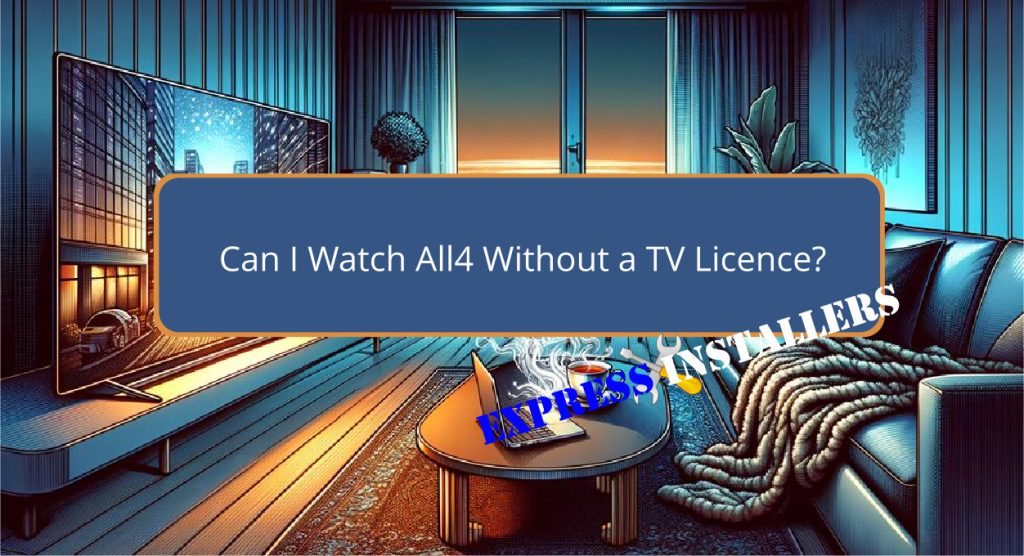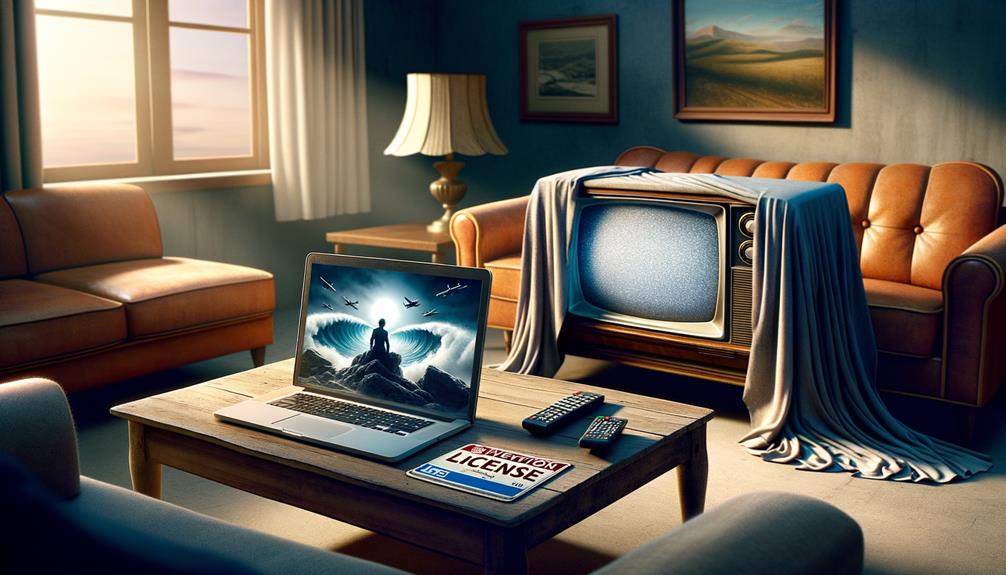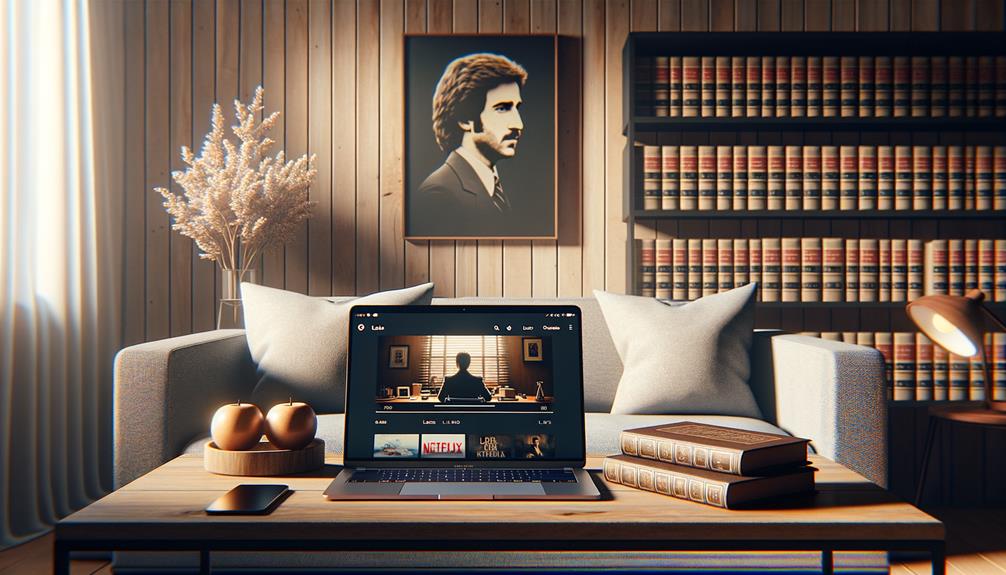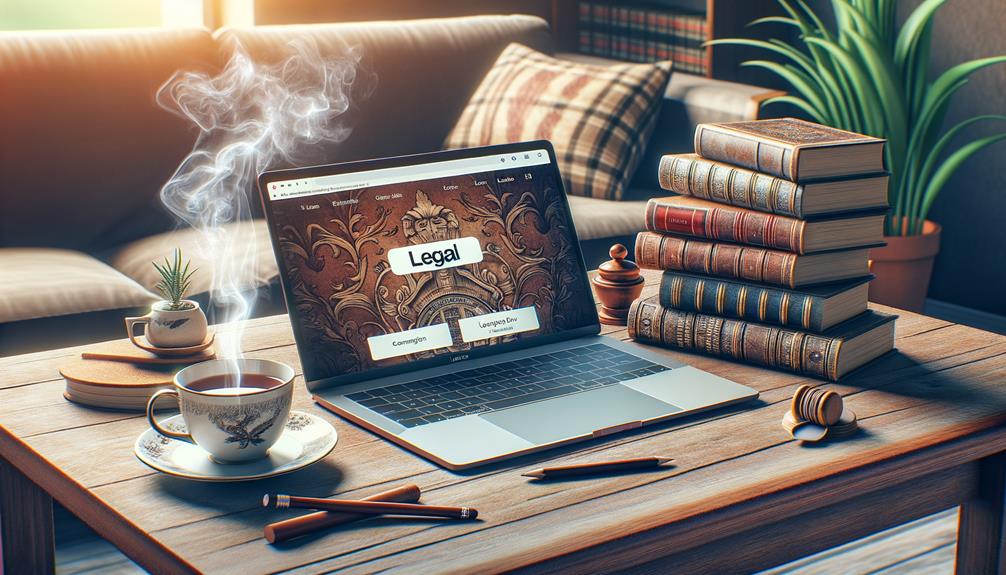
You can watch on-demand content on All4 without a TV Licence, as the service primarily offers catch-up TV and previously aired programs.
The distinction is clear under the current regulatory framework; TV Licensing is required for streaming live broadcasts on platforms such as Channel 4, but not for accessing on-demand services.
It is important to distinguish between live broadcasting and on-demand viewing to guarantee legal compliance.
Non-compliance with these regulations can lead to fines and legal repercussions. Understanding these distinctions further will help in managing your options responsibly.
Quick Summary
- You can watch on-demand content on All4 without a TV Licence.
- A TV Licence is required only for watching live broadcasts on All4.
- On-demand services on All4 include catch-up TV and previously aired programs.
- Viewing options on All4 are flexible and do not require a subscription.
- Ensure compliance by understanding the difference between live and on-demand content on All4.
Understanding All4 Streaming
All4 streaming service provides viewers with the legal opportunity to access on-demand content without the necessity of a TV Licence.
This exemption from the standard licensing requirements is due to All4’s focus on catch-up TV and previously aired programs, distinguishing it from platforms that primarily offer live broadcasts or content from BBC iPlayer.
The regulatory framework for streaming services like All4 allows users to enjoy a diverse array of content at their convenience, adhering to streaming regulations that prioritise accessibility and flexibility.
Additionally, All4 does not impose subscription costs, offering free access that enhances its appeal.
Viewers can choose from various viewing options, optimising their experience based on personal preferences and device compatibility, thereby maximising content availability.
Definition of Live TV
To fully comprehend the legal implications of streaming services, it is necessary to define what constitutes Live TV.
Live TV encompasses any content that is broadcast in real-time and viewed simultaneously as it is being aired.
This includes a range of programming such as news broadcasts, live sports events, and other scheduled content on traditional TV channels.
The defining characteristic of live TV is its real-time viewing nature, meaning the audience watches the content at the same time it is broadcast.
This is distinct from on-demand services where content can be watched at any time after its original broadcast.
Understanding this distinction is essential for determining the applicability of TV Licensing regulations, particularly when using platforms like All4.
Implications of TV Licensing

Understanding the TV Licensing requirements is crucial for users of All4, especially when accessing live broadcasts or streams on platforms such as Channel 4, E4, More4, and Film4.
The licensing implications of not following these regulations are significant. Users must make sure they have a valid TV Licence when engaging with live content to avoid legal repercussions.
Non-compliance can result in substantial fines and potential prosecution.
The compliance consequences underscore the importance of grasping the distinction between live content, which requires a licence, and on-demand services, which do not.
Clarification from official TV Licensing FAQs can help viewers in adhering to these requirements, ensuring that they stay within legal boundaries while enjoying their preferred content.
Exploring On-Demand Services
In addition, compliance with TV Licensing is mandated for live broadcasts, viewers can freely enjoy the plethora of on-demand services offered by All4 without such obligations.
All4’s on-demand content, exempt from TV Licence requirements, encompasses a broad range of programs that cater to diverse viewer preferences.
This flexibility is part of the broader trend where streaming services have revolutionised media consumption, offering tailored viewing experiences without the need for traditional broadcasting schedules.
Additionally, All4 and similar platforms often employ subscription models, allowing users to access enhanced features or an ad-free experience.
These models provide a customisable approach to media consumption, aligning with the digital age’s demand for consumer-controlled viewing.
Legal Requirements for Viewers

Regarding the legal requirements for viewers, it is crucial to note that a TV Licence is not required for enjoying on-demand content on All4, provided that live streams are not accessed.
This delineation underscores the viewer’s responsibility to distinguish between on-demand services and live broadcasting.
Engaging in live TV streaming on All4 mandates compliance with legal obligations to possess a valid TV Licence.
This requisite aligns with the broader regulatory framework designed to guarantee fair remuneration for content creators and broadcasters.
Viewers must be vigilant and well-informed about the nature of the content they access on platforms like All4 to strictly adhere to statutory provisions and avoid any legal repercussions associated with non-compliance.
Exceptions to TV Licence Rules
Several exceptions to the general rule requiring a TV Licence exist, including the use of All4 for on-demand content, which does not necessitate such a licence.
Specifically, TV Licensing regulations clarify that on-demand exemptions apply to services like All4, where viewers are not watching live broadcasts but are instead accessing pre-recorded shows and films at their convenience.
This distinction is critical in the legal landscape surrounding television viewership.
Moreover, the catch-up content clarification in the regulations guarantees that viewers utilising All4 to watch episodes after they have been broadcast are also exempt from the need for a TV Licence, provided they are not accessing live content or using BBC iPlayer.
These provisions offer significant flexibility for users of on-demand services.
Watching All4 on Different Devices

Accessing All4 on various devices, such as smartphones, tablets, computers, and smart TVs, allows users to enjoy a wide range of on-demand programming without the need for a TV Licence, provided they steer clear of live broadcasts.
The All4 app enhances device compatibility and streaming quality, ensuring a superior viewing experience across different platforms.
| Device Type | Compatible with All4 App |
|---|---|
| Smartphones | Yes |
| Tablets | Yes |
| Computers | Yes |
| Smart TVs | Yes |
| Gaming Consoles | Yes |
This table illustrates the versatile nature of the All4 app, which is designed to function seamlessly across a broad spectrum of devices, affirming its commitment to accessibility and user satisfaction.
Consequences of Non-Compliance
What are the potential repercussions for failing to comply with TV licensing regulations when watching or recording live broadcasts?
Non-compliance risks substantial legal and financial consequences. Individuals found watching or recording live TV, or accessing BBC iPlayer without a valid TV Licence could face fines up to £1,000.
This penalty underscores the seriousness of such violations and the importance of adhering to licensing laws.
Additionally, failure to declare exemption accurately can trigger investigations, potentially leading to further legal action.
These measures guarantee the funding and support for public broadcasting services, emphasising the consequences of violations that undermine this system.
It is imperative for viewers to understand and abide by these regulations to avoid these significant repercussions.
Tips for Lawful Viewing

To guarantee compliance with TV licensing regulations while enjoying All4, viewers must refrain from watching live broadcasts and accessing BBC iPlayer through the service. Observing these rules helps avoid the legal implications of non-compliance.
Here are specific compliance tips:
- Check Broadcast Status: Confirm the program is not live before viewing.
- Avoid BBC iPlayer: Access to BBC content requires a licence, even on All4.
- Use On-Demand Features: Stick to watching shows offered on-demand to remain compliant.
- Educate Household Members: Make sure everyone in your household understands these restrictions.
- Regularly Review Regulations: Stay updated on any changes to TV licensing laws to ensure ongoing compliance.
These steps help maintain lawful use of All4 without a TV licence.
Additional Resources and Support
For viewers seeking further guidance on understanding the regulations surrounding All 4, several resources and support systems are available.
To navigate the intricacies of licensing exemptions and understand viewer rights, the official TV Licensing website provides detailed information and FAQs that address common concerns and scenarios related to on-demand services like All 4.
Additionally, Channel 4’s own customer support can assist viewers in clarifying their legal obligations and offer specific viewer assistance related to their service.
Legal advice charities and consumer rights organisations also offer guidance and can help interpret how these licensing regulations apply to individual circumstances, ensuring that viewers remain informed and compliant while enjoying their favourite shows on All 4.
Frequently Asked Questions
Do You Need a TV License to Watch All 4?
To watch All4 content, a TV Licence is not required due to specific licence exemptions for on-demand services. This allows viewers to access All4’s library without the legal obligation of a TV Licence.
How to Avoid Paying TV License?
To legally avoid paying a TV Licence, consider using subscription services that offer on-demand content, such as Netflix or Amazon Prime, which do not require a licence unless accessing live broadcasts or BBC iPlayer.
What Happens if I Watch BBC Iplayer Without a TV License?
Watching BBC iPlayer without a TV licence has legal implications, including potential fines up to £1,000. Enforcement methods include detection of unlicensed use and subsequent legal action to guarantee compliance with broadcasting regulations.
How Do TV Licences Catch You?
TV license enforcement utilises advanced detection technology, including database cross-referencing and targeted investigations, to identify and penalise unauthorised viewers, ensuring compliance with broadcasting regulations and licensing requirements.
Conclusion
To summarise, individuals looking to use All4 for on-demand services are not required to possess a TV licence, as long as they avoid watching live broadcasts.
However, it is crucial to follow legal requirements to avoid penalties.
Using All4’s streaming service on different devices provides flexibility, but users must be diligent in complying with licensing laws.
It is recommended to consult additional resources and seek support to guarantee a thorough understanding and legal engagement with digital streaming platforms.
